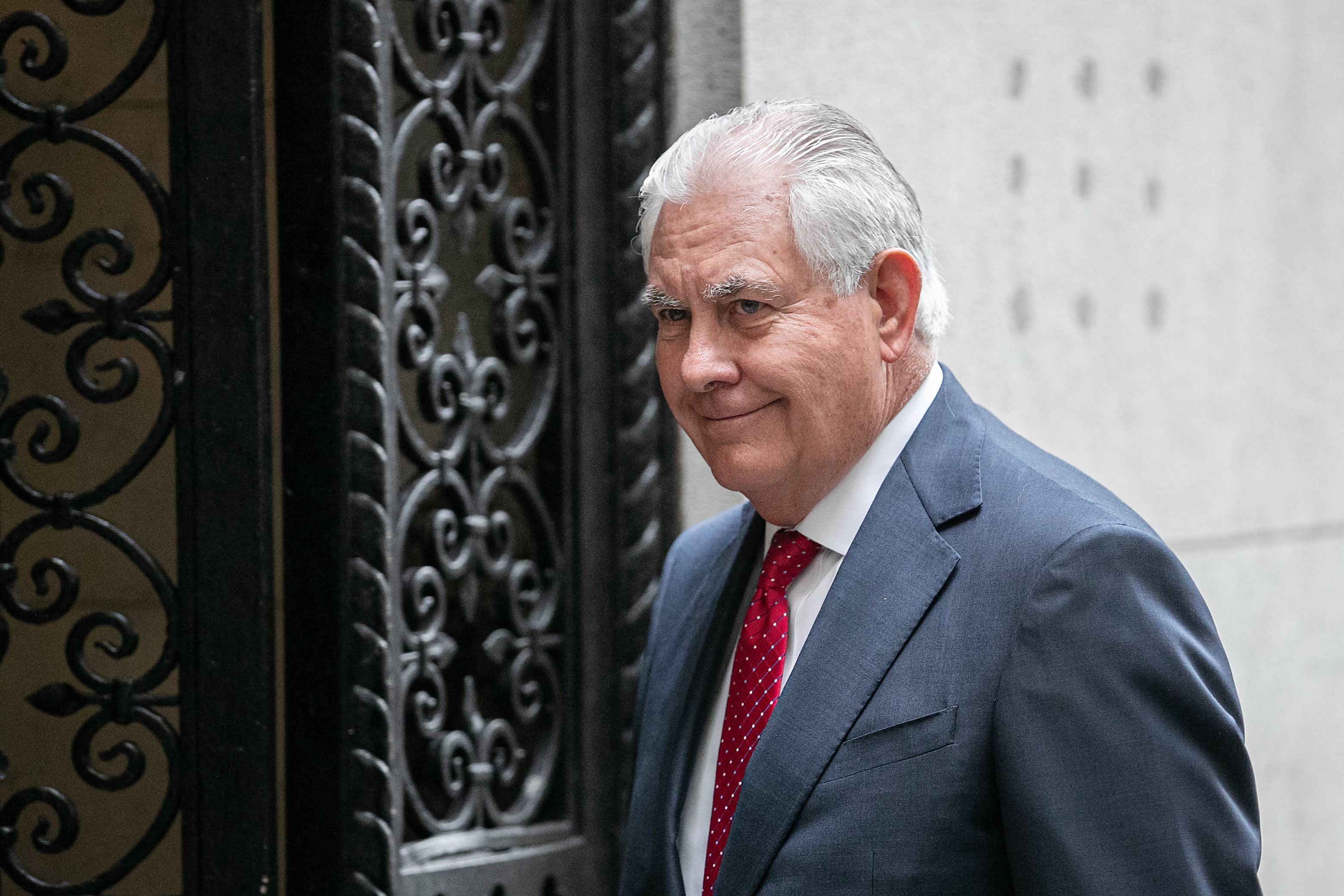This post was originally published on this site

Former Exxon CEO Rex Tillerson said the company tried to understand the impact of climate change, and tried to accurately communicate the impact to shareholders, as he testified on Wednesday in New York during the second week of a trial against the oil giant.
The case, brought by New York Attorney General Letitia James, alleges that the company deceived investors about the true cost of climate change. The $1.6 billion suit is the result of a four-year investigation, and the first climate fraud suit to go to trial.
Rex Tillerson, former chief executive officer of Exxon Mobil Corp., arrives at state court in New York, U.S., on Wednesday, Oct. 30, 2019.
Jeenah Moon | Bloomberg | Getty Images
Exxon assesses the impact of climate change through a public proxy cost, as well as through a greenhouse gas cost. The former reflects the cost of climate policies that could reduce the demand for oil and natural gas, while the latter focuses on actual costs and expenses associated with current and future regulation. These costs are meant to show shareholders that the company is calculating the impact of climate change and waning fossil fuel demand on long-term projects.
New York’s case accuses the company of misrepresenting these costs. Attorney General Letitia James argues that Exxon used one set of numbers publicly, while operating with a less conservative forecast internally. She claims that Exxon was therefore deceiving shareholders since the company was making its assets seem more secure.
Tillerson took the stand at 9:25 a.m. ET on Wednesday, and New York state attorney Kim Berger began questioning the former executive. The questioning lasted about 90 minutes, and focused on how the company reports carbon costs, and how the company factored increased costs from regulation into its long-term outlook.
Under cross-examination by Exxon attorney Ted Wells, Tillerson once again said that the company took climate change seriously for years, and that the company created a systematic approach for how to factor in increasing costs. He said that climate change was one of the many risks the company had to manage, and that he supported a carbon tax as a regulatory measure since it could be adapted as the science around global warming evolves.
When asked directly by Wells if the company would have any incentive to undercut cost assumptions, Tillerson said no.
“When you become CEO you know you have to take a lot of criticism targeted at you. I feel bad for men and women at ExxonMobil Corp., because they are accused of a fraud as well. They are professionals, diligent, operate at high levels of integrity. Sometimes I wish I could step back in time and should not have put a plan in place. Maybe we should have stuck our heads in the sand,” he said when Wells asked how it felt to be publicly accused of fraud.
Berger did not question Tillerson about his use of an alternate email address while at Exxon.
During the investigation, James found that in addition to using his company email, Tillerson also communicated through the alias Wayne Tracker. In 2017, Exxon lawyer Ted Wells said that “the purpose was efficiency, not secrecy.”
“Were it otherwise, emails to the Wayne Tracker account would have scrupulously avoided any reference to Mr. Tillerson as the intended recipient. Instead, numerous emails to the Wayne Tracker account are expressly addressed to Mr. Tillerson or contain his initials in the body of the email,” his letter to the judge went on to say.
The trial, which began last week, is the result of a four-year investigation.
In 2015, then-New York Attorney General Eric Schneiderman first announced his investigation of the company. At that point, the charge was broader, claiming that the company knew about the impact of carbon emissions on climate change for decades, but covered it up.
Since then, the case has narrowed in scope. It’s now under New York’s Martin Act, which is a 1921 law meant to protect investors from false statements from corporations, even if the company wasn’t intentionally trying to be deceptive.
“This is a case about the disclosures ExxonMobil made about its use of a cost of carbon to hedge against the risk of more exacting regulations and what a reasonable investor would have understood those disclosures to mean,” the October 7 pretrial memo reads. “By representing that it was applying higher projected carbon costs than it was actually using, ExxonMobil made its assets appear significantly more secure than they really were, which had a material impact on its share price. In so doing, ExxonMobil defrauded its investors under the Martin Act.”
Exxon denies the charges, saying the case is misleading, politically motivated, and the result of a coordinated effort by anti-fossil fuel groups. It says that the two costs were used for different purposes and should not be conflated.
Tillerson served as Chairman and CEO of Exxon from 2006 to 2017, before stepping down to become the secretary of state under President Donald Trump.
Justice Barry Ostrager is presiding over the case, and there is no jury.
New York’s trial is the first for Exxon, but there could be more to come. Last Thursday Massachusetts’ Attorney General filed a suit alleging that the company violated the Massachusetts Consumer Protection Act. BP, Chevron, and Royal Dutch Shell are also currently facing lawsuits.





